Qatar crisis: After the deadline, what next?
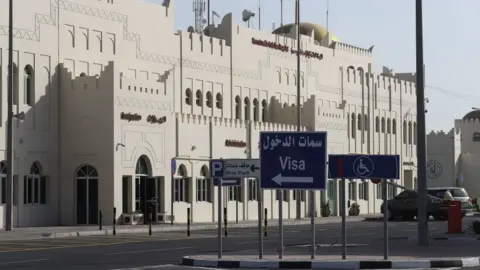 AFP
AFPThe latest deadline set by Gulf Arab states for Qatar to submit to a humiliating list of 13 demands is due to expire at midnight on Tuesday.
Qatar has already submitted its response to Kuwaiti mediators and its foreign minister has said the demands were so unrealistic they were "meant to be rejected".
UAE officials have told the BBC that after the deadline expires the offer for Qatar to return to the Arab fold will be off the table, the economic and political sanctions on it will become permanent and Qatar will be ostracised by its closest Arab neighbours.
The West should worry about this latest crisis in the Middle East for two reasons.
First, Qatar is a key ally in the on-going fight against so-called Islamic State (IS). Qatar hosts al-Udaid, the largest US airbase in the Middle East.
Secondly, Qatar has an estimated $335bn (£254bn) strategically invested globally, with billions pumped into the UK and US economies. If the West is forced to choose between Qatar and its opponents then those investments could, theoretically, be at risk.
So what is this all about?
It is about terrorism or it is about foreign policy, depending on which side you listen to.
Qatar stands accused of supporting terrorism and extremism by a triumvirate of Gulf Arab states - Saudi Arabia, UAE and Bahrain - backed by Egypt and others.
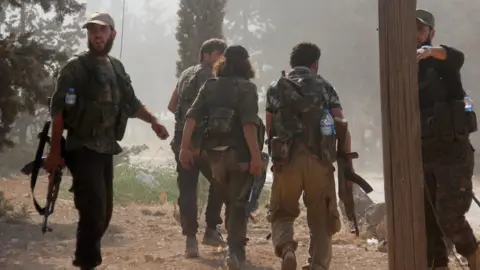 AFP
AFPThey say that for 20 years now, Qatar has been destabilising the region by supporting Islamist groups like the Muslim Brotherhood, al-Qaeda and IS. They say Qatar promised in 2014 to stop supporting such groups yet it has continued regardless.
They also accuse Qatar of paying more than $1bn in ransom money to Iranian-backed Shia militia groups to secure the release of a royal hunting party who got kidnapped in Iraq while hunting wildfowl.
Qatar denies all charges of supporting terrorism, as well as paying ransoms to terrorist groups. The Qataris say this row has nothing to do with terrorism, and that this is really about its powerful neighbours trying to force Qatar's foreign policy into line with Saudi Arabia's. Qatar's Foreign Minister calls it an attack on his country's sovereignty.
What are the Gulf Arab demands?
The 13 demands include closing down Qatar's controversial satellite TV network, Al Jazeera, which has long been a thorn in the side of its conservative neighbours. Another demand is the closing of a Turkish military base, recently reinforced by a contingent of troops and armoured vehicles.
And a further demand is the scaling back of diplomatic ties with Iran, with whom Qatar shares the largest offshore natural gas field.
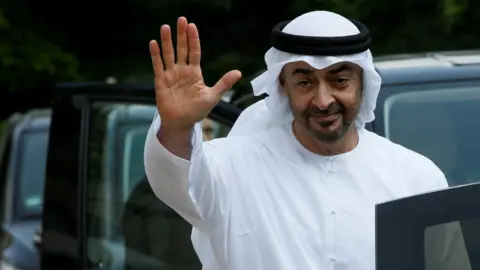 Reuters
ReutersThe list of demands was prompted by US frustration that the Arab bloc had failed to state clearly what they expected of Qatar in this dispute. The US, which is trying to mediate the dispute, asked for the demands to be "reasonable and actionable".
Does Qatar have a case to answer?
Yes it does, but so too does Saudi Arabia.
For years now, Qatar has had close links with political Islamist groups like the Muslim Brotherhood, Hamas in Gaza and Islamist factions in Libya and Syria. Al Jazeera stands accused of airing the views of extremist preachers who support acts most people would consider as terrorism.
The conservative, tribal monarchies that surround Qatar - the al-Saud in Saudi Arabia, the al-Nahyans in Abu Dhabi and the al-Khalifa in Bahrain - all view these Islamist groups as a threat to their rule and in some cases they accuse the Muslim Brotherhood of being synonymous with terrorism.
So has Qatar actually funded terrorism? Absolutely not, say Qatari officials who came to London last week. Yet when I met the head of Qatari Intelligence in 2014, he told me they had been able to secure the release of several hostages in Syria from the proscribed terrorist group Jabhat al-Nusra, backed at the time by al-Qaeda. Kidnappers do not willingly release their hostages without getting something in return.
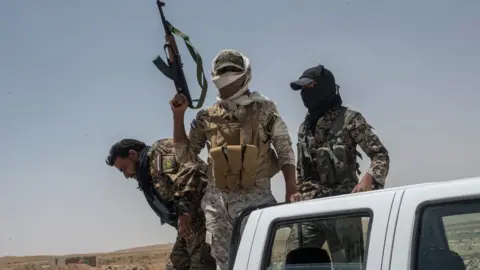 Getty Images
Getty ImagesQatar's accusers have published a detailed list of 59 named individuals they say are all proven terrorism supporters and who are at large in Qatar. One is even a member of the extended ruling family.
Qatar says the list is a politically-motivated fabrication and that anyone on its soil suspected of terrorism is either prosecuted or placed under 24-hour surveillance.
Does Saudi Arabia have a case to answer?
For many, the notion of Saudi Arabia accusing another country of supporting Islamic extremism is a strange one. Fifteen of the 19 suicide hijackers in the 9/11 attacks of 2001 were Saudis (not one was Qatari). More than 4,000 Saudis have gone to join IS, although the Saudi authorities did belatedly try to stop them.
More importantly, there is a commonality of extremist views and practices that are shared by IS and thousands of religious conservatives in Saudi Arabia, known as Wahhabis. These centre around the notion of takfir, meaning declaring another Muslim to be an "apostate" if they don't adhere to your ultra-strict version of Islam.
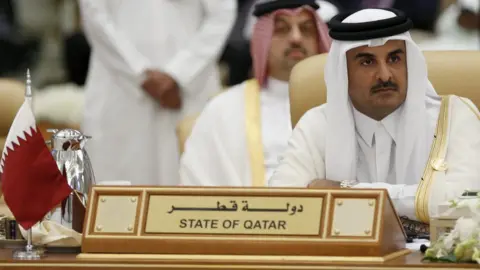 Reuters
ReutersTo many takfiris, all the world's 150-200m Shia Muslims are heretics. Churches and all non-Muslim acts of worship are banned in Saudi Arabia. The beheading of prisoners is a practice shared by the Saudi state and IS.
There are many in Saudi Arabia who would like to see the country move away from its strict interpretation of Islam and the new Crown Prince, Mohammed Bin Salman, has already curtailed the powers of the religious police.
But Saudi Arabia's funding of mosques, schools and textbooks around the world continues to bring accusations that it is supporting extremism.
Is the UK involved in this row?
Not directly, but Qatar has called on its allies including Britain to help lift what it calls the blockade placed on it by the Arab bloc. There have been discussions about setting up a pan-Gulf monitoring system to check if any country is secretly funding terrorism or extremism. Qatar and the UAE have both said they would submit to this but Saudi Arabia's position is less clear.
For the UK, perhaps the most dangerous escalation of the crisis would be if the Arab bloc were to force countries to choose between doing business with Qatar or with them (also worth billions of pounds in Britain's case).
Qatar owns Harrods, 95% of the Shard building, 22% of the London Stock Exchange, nearly 6% of Barclays plc and 50% of Canary Wharf. In a post-Brexit world especially, these are not investments Britain could afford to divest.
Could it lead to war?
Unlikely but it is just possible.
The UAE government spokesman has told me his country has no plans to "militarise" the row and certainly any outbreak of armed conflict would be disastrous for all sides.
Qatar has a longstanding military agreement with Turkey and hosts a Turkish base as well as a US one. The Qatari Ambassador to Moscow, Fahad al-Attiyah, told me last week he believed the presence of reinforced Turkish troops in Qatar had helped to deter an invasion.
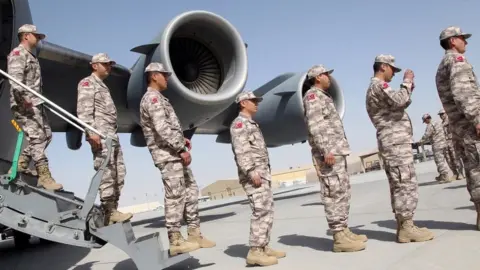 Reuters
ReutersAll the countries involved in this row have spent staggering sums of money on sophisticated western weaponry, none of which was ever intended to be turned on one of their own. The US plans to sell $12bn of F15 warplanes to Qatar but this is being blocked by Senator Bob Corker, chairman of the Senate Foreign Relations Committee, who wants a block on all arms sales to America's Gulf Arab allies until this dispute is resolved.
Why are Turkey and Iran getting involved?
Turkey's government is backing Qatar, flying in troops and materiel to help it survive the severing of air links with Gulf Arab neighbours.
Turkey and Qatar both support political Islam and last week a high-level Qatari delegation was in Ankara meeting the Turkish defence minister to discuss future cooperation as well as joint manoeuvres. An added complication here is that Turkey, already embroiled in the Syrian civil war, is a Nato member.
Iran is a maritime neighbour of Qatar's and they share the vast North Dome gas field beneath the waters of the Gulf. Since Qatar has to import much of its food supplies and the land border with Saudi Arabia is now closed, Iran has been flying in regular plane loads of food, something the Qataris have compared to the Berlin Airlift of 1948.
Qatar insists it has every right to maintain good relations with Tehran, pointing out that Oman, another Gulf Arab neighbour does the same without criticism. In the long term, if this crisis is not resolved, expect to see a strengthening of Qatar-Iran ties.
What happens now?
So far, mediation efforts by both Kuwait and the US have been unable to bridge the very wide gap between the two sides. The Saudis say their demands are non-negotiable, the Emiratis say there is zero trust with the Qataris and Qatar says it will not negotiate while it is "under siege with an illegal blockade".
The foreign minister of Saudi Arabia, Bahrain, the UAE and Egypt are due to meet in Cairo on Wednesday to discuss and co-ordinate their next move.
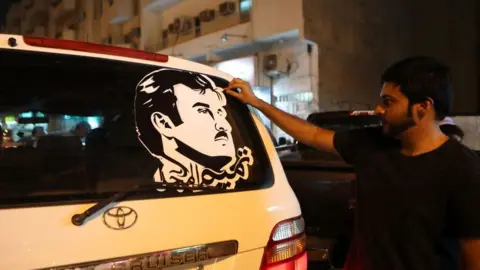 AFP
AFPEven if some face-saving formula is found to at least partially lift the current sanctions and patch up differences on the surface, the wounds from this row go too deep now. The GCC, the Arab Gulf Cooperation Council founded in 1981, is effectively broken and is unlikely to be able to be stitched back together as a functioning, unified entity in its present form.
In practice, barring an unlikely complete capitulation by Qatar, down the line this means we are likely to see the Gulf Arab states split into three undeclared blocs. The hard core will be Saudi Arabia, UAE and Bahrain, the three countries most critical of Qatar's behaviour. Qatar, unless it capitulates to their demands, will be largely on its own but supported by non-Arab Iran and Turkey. Neutral and on the sidelines will be Oman and Kuwait who simply wish to maintain good relations with all sides and for whom this row is deeply unwelcome.
The only beneficiaries of this future Gulf Arab fragmentation will be Iran, the arch rival of Saudi Arabia, and IS - always ready and willing to exploit any weakness amongst its enemies.
